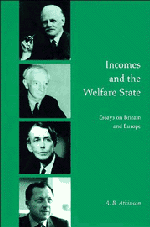Book contents
- Frontmatter
- Contents
- List of figures
- List of tables
- Preface
- Introduction
- I Income inequality and poverty in Britain and Europe
- 1 What is happening to the distribution of income in the UK?
- 2 Income distribution in European countries
- 3 Poverty, statistics and progress in Europe
- 4 Comparing poverty rates internationally: recent studies in OECD countries
- 5 Two nations in early retirement? The case of Britain
- II Analysis of the Welfare State
- III Targeting and the future of social security policy
- Notes
- Bibliography
- Name index
- Subject index
5 - Two nations in early retirement? The case of Britain
Published online by Cambridge University Press: 03 May 2011
- Frontmatter
- Contents
- List of figures
- List of tables
- Preface
- Introduction
- I Income inequality and poverty in Britain and Europe
- 1 What is happening to the distribution of income in the UK?
- 2 Income distribution in European countries
- 3 Poverty, statistics and progress in Europe
- 4 Comparing poverty rates internationally: recent studies in OECD countries
- 5 Two nations in early retirement? The case of Britain
- II Analysis of the Welfare State
- III Targeting and the future of social security policy
- Notes
- Bibliography
- Name index
- Subject index
Summary
In 1955, Richard Titmuss described Britain as having ‘two nations in old age’: one group relatively fortunate, benefiting from an occupational pension and being able to draw on savings privileged under the income tax, the other group receiving only the basic state pension, which left them dependent on means-tested assistance (the successor of the Poor Law). There were:
greater inequalities in living standards after work than in work; two contrasting social services for distinct groups based on different principles, and operating in isolation of each other as separate, autonomous, social instruments of change.
(1955, p. 166)At that time, the position of the early retired was relatively little discussed, for the simple reason that those ceasing work before the minimum retirement age constituted only a small proportion of the age group. Of men aged 55-64, who are the focus of this chapter, in 1961 the proportion in England and Wales who were employed or self-employed was 89 per cent, and only 5.6 per cent described themselves as ‘inactive’ (Trinder, 1989, table 2.1). The labour force participation rate decreased slightly up to 1975 - see figure 5.1 – but then began to fall sharply, first for the 60-4 age group, and then after 1981 for those aged 55-9. By 1987 the proportion of the whole age group 55-64 classified as ‘economically inactive’ had reached 32.3 per cent (Trinder, 1989, table 2.1).
- Type
- Chapter
- Information
- Incomes and the Welfare StateEssays on Britain and Europe, pp. 95 - 118Publisher: Cambridge University PressPrint publication year: 1996

